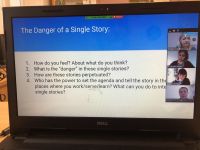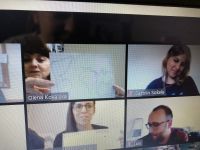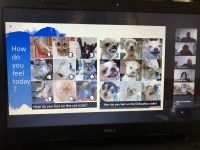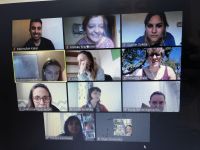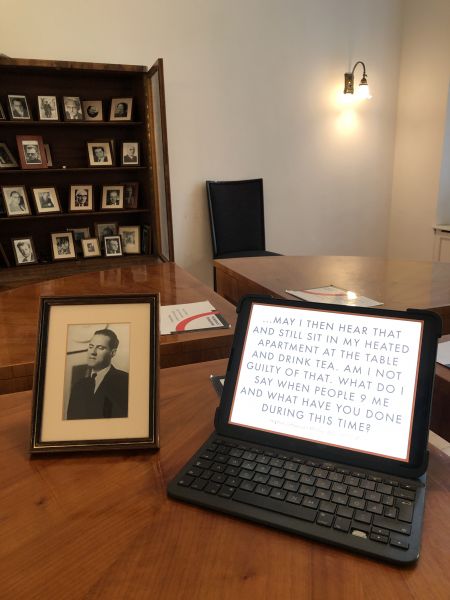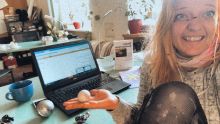Before we finally realize a project, months of hard work are already behind us.
Almost a year ago, we, the Krzyzowa Foundation and our partner, the Kreisau-Initiative e.V., won the NETTZ-Förderpreis. The awarded project was #CreatingSpace A digital future with ethics in mind. The starting point for the project was the reflection that we, as institutions of civic education, increasingly see the need of not treating civic education and digital competences as separate issues. However, it seems to us that it is necessary to work on expanding media literacy through inclusion of competences in the field of digital media ethics.
Thus, first we were awarded the price. Then it was followed by the successful launch event in December and our first event on digital ethics took place in Kreisau. Full of energy for action we then went into the conception to continue the project series in 2020. The participants* were recruited and the financing was secured, but then came Corona and the question was: Do we dare to do it online? YES!
After an organisational marathon and thanks to the flexibility of our sponsors, the Foundation for German-Polish Cooperation and the Konrad Adenauer Foundation and the participants*, the concept for the online training was ready after a few days of intensive work.
Now follows an interview with Agnieszka Zeganska and Charlotte Lohmann, both education specialists of the IYMC Krzyzowa, how they experienced the online training. The special thing about the interview is that it is conducted in German and Polish, because that is the reality in which the IYMC in Krzyzowa works. In our daily work we are surrounded by different languages every day, which tuck us up like a piece of clothing that people like to wear. One gets used to it and never wants to take it off.
We would like to share the magic of language diversity with you:
Agnieszka: What was your motivation to carry on with the project instead of postponing it until after Corona?
Charlotte: It was a clear and quick impulse that jump into my head when I wrote to the participants the cancellation of the project #Creating Space A digital future with ethics in mind, in March 2020: "We are talking about digital ethics, a topic that especially in Corona times underlines the topicality and importance and cancel our training? No, no, no. That would be so wrong! If I am honest, I have completely underestimated the preparation and work, but I find everything digital and new media super exciting, yes, that's what my heart is beating for, and in fact I found the thought really funny and charming that I will lead a training from my kitchen with multipliers from Ukraine, Poland and Germany. Yes, and of course the topic of digital ethics is extremely important and wouldn't it be wrong not to offer a platform for learning and exchanging ideas in the virtual Space? What we need, and Corona has strengthened this once again, is a framework of values that can be applied in virtual space and provides orientation. Otherwise the Internet will blow up in our faces.
Charlotte: Why is it important when you run an online training to ask what the participants* had for breakfast?
I find it very important, at the beginning of any training, to feel some type of connection before getting into “real stuff”. This is one of the most challenging parts of the training online, because there are no common meals, no time together in the seminar room waiting for the trainer to start. Telling about their breakfast is an invitation to participant’s homes, private lives. And the topic of breakfast, however easy, can open a smooth and sometimes funny discussion, comparisons and finding common space.
The second aspect is that from my observation it is quite difficult to present oneself at the beginning of any training. With the shift into virtual space, the time we have for participants’ presentations needs to be shortened, so the simple, funny question about the last meal makes it easier to speed up this process, while staying to the point.
Agnieszka: What was the biggest challenge for you in organising and/or running webinars?
Charlotte: The choice of clothes. No, that was a joke. In fact, it was incredibly important to me that the participants were convinced to do it online and didn't have to be afraid of all the different tools. But since it was my first time, I didn't feel 100% safe and I was hoping that nobody would see this. I was afraid of that so we organized a preparation meeting to take away the fear of the participants, that was great! And it was really nice to observe how the participants, just like me, learned more and more every day how to use the digital tools and in the end everybody was relaxed. By the way, group dynamics was also a big concern of mine, how is this going to work digitally? And it was so great! Thanks also to the group, we really managed to build up a group dynamic, I am especially proud of that. Did you know that with Harry Potter music and digital energizers you can create a great group feeling? Nope, me neither! :)
Charlotte: Were you afraid or nervous before leading the online training?
Agnieszka: I was terrified. In the everyday business of running youth exchanges and international seminars, which we conduct in IYMC in Krzyżowa, good relations, movements, exchange of thoughts and non-formal education methods based on direct contact are the foundation of any fruitful meeting. And even tough each project are days or sometimes weeks of intensive preparations, in some unexpected moments, flexibility and ability to improvise can save the day.
And now, I suddenly had to design from the scratch new methods based on new tools knowing, that I’m no longer able to draw the illustration I need on the whiteboard. How to make visual brainstorm, when the colorful papers are not available? What kind of movement should I offer so that it would not be to awkward? How to invite and encourage the participants* to work in small groups? After a few days I had spent on reflection and research how to do it, it still took me over eight hours to prepare one-hour-long webinar on the topic very familiar to me! I knew that there was no space for improvisation there: all the slides, apps, pictures, links, films had to be ready in advance – so I must admit that the preparation process was quite stressful.
The second stressful things, already while conducting the webinar, was the fact that when I was sharing my screen, I stopped seeing the participants*, whom I cannot hear at the same time, since they were muting their microphones to avoid disturbing. Therefore, some kind of reaction, whether the things I was saying were interesting and understandable, was lacking. Receiving feedback is a crucial thing to me, and in case of the online training I got it only after the project. Brakowało mi w związku z tym takiej reakcji czy rzeczy, które mówię są zrozumiałe i ciekawe? Informacja zwrotna jest dla mnie bardzo ważną sprawą, a w wypadku szkolenia online dostałam ją dopiero po projekcie.
Agnieszka: Which aspect was most satisfying for you?
Charlotte: The question I asked myself before and still ask myself is, how deep can the online training go? I have not yet answered this question 100%, but after the experience I am sure that deep learning goals can be achieved. We have done so many workshop exercises that I only know from the analogue room and they worked really well. A really strong moment of the group was when we did an anti-discrimination method and then reflected on the exercise in the plenary. I still get goosebumps when I think about how deep and exciting this discussion was.
Another moment was when a participant on day 3 said that since day 2 she has had the feeling that when she closes her laptop in the evening she is really looking forward to the next day. That was nice!
Charlotte: What was the funniest moment during the training? And how did you feel after closing the training?
Agnieszka: I can actually think of two. I enjoyed doing “Which cat are you?” method with the participants. Since my webinar was at 7pm on Saturday, I knew I need to start with some good vibe – so I published a picture of funny cats and asked them which cat they were. What I enjoyed was that the “cat reference” stayed with us until the end of the training. At any point they would say “I feel like the cat number 7 now”.
The second part was actually something created by the application itself: it was so funny to see people appearing and disappearing when going into discussion rooms. Then I loved how you had come up with the idea to combine this process with the background music from “Harry Potter”. This was funny, but also created the feeling of community and I think that is the strongest feeling I have after the project. We had a lot of interesting discussions, but even more importantly we created some bond and I am impressed that it was possible online.
Agnieszka: What was the funniest moment for you during training?
Charlotte: Maybe a bit embarrassing but also funny was that I sent the participants into breakout sessions and they finished faster than I thought and well, I said they were safer with the platform zoom from day to day, so they returned to the main room by themselves and there I was, alone using my screen and webcam as a mirror. That means the participants came back while I was putting on my make-up. :)


